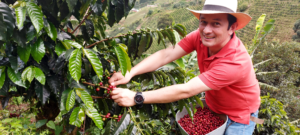Heavy rains are a common challenge for coffee producers at this time of the year in Antioquia, Colombia. At Cafelumbus, we understand the importance of weather patterns and their significant impact on coffee production. Explore how these heavy rains affect our farms and the measures we take to ensure the quality and sustainability of our coffee.
The Effects of Heavy Rains
Heavy rains can cause several issues for coffee farms, including:
- Soil Erosion: Heavy rains can wash away the nutrient-rich topsoil, essential for healthy coffee plants.
- Plant Damage: Excessive water can damage the roots and leaves, flowers, branches, and also the unmature bean living on the coffee plants, leading to lower yields.
- Increased Pests and Diseases: Wet conditions create an ideal environment for pests and diseases that can harm coffee plants. Two of them are the coffee borer, and the coffee rust.
Impact on Coffee Quality
These factors can significantly impact the quality of the coffee beans. Our producer partners at Comercializadora Cumbres take pride in delivering premium green Colombian specialty coffee and are committed to maintaining this standard even in the face of adverse weather conditions.
Regenerative Agriculture is The Key
Water Retention and Soil Health
Beneficial weeds play a crucial role in retaining moisture in the soil. By covering the ground, they reduce water evaporation, helping to maintain a consistent moisture level. This is especially important during dry periods, as it ensures that coffee plants have access to the water they need to thrive.
Erosion Control
Weeds with extensive root systems help anchor the soil, preventing erosion caused by heavy rains. This helps maintain soil structure and fertility, which are essential for the healthy growth of coffee plants.
Nutrient Cycling
Certain beneficial weeds can contribute to nutrient cycling by breaking down organic matter and releasing essential nutrients back into the soil. This natural process enriches the soil and supports the coffee plants’ nutritional needs.
Biodiversity and Pest Management
A diverse ground cover of weeds can support a variety of beneficial insects and microorganisms. This biodiversity can help control pest populations naturally, reducing the need for chemical interventions.
Shade and Microclimate Regulation
Some weeds can provide a natural shade cover, helping to regulate the microclimate around coffee plants. This can protect young coffee plants from harsh sunlight and temperature extremes, promoting healthier growth.



Heavy rains challenge coffee production in Antioquia, Colombia, causing soil erosion, plant damage, and increased pests. At Cafelumbus, we recognize these impacts and work closely with our partners at Comercializadora Cumbres to maintain premium quality coffee despite adverse conditions.
Regenerative agriculture plays a key role in our strategy. Beneficial weeds help retain soil moisture, prevent erosion, enrich the soil, support biodiversity, and regulate the microclimate. These practices enhance soil health and sustainability, ensuring we continue to deliver exceptional Colombian specialty coffee.




